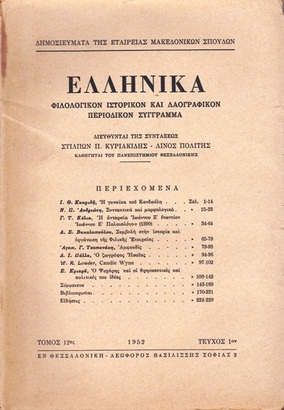Δίκης ΄Ονομα : Διαστάσεις της Δίκης στη φιλοσοφία του Ηράκλειτου
Part of : Ελληνικά : φιλολογικό, ιστορικό και λαογραφικό περιοδικό σύγγραμμα ; Vol.49, No.2, 1999, pages 225-243
Issue:
Pages:
225-243
Author:
Abstract:
Dike, a concept originally formed in the βουληφόρος αγορά, acquires a cosmic meaning and considerable symbolic significance in early Greek philosophy. Anaximander is the first to use Dike in this way. He explained the constant interchange between opposed substances by means of a legalistic metaphor; according to him (fr. 1) the prevalence of one substance at the expense of its contrary is «injustice», and a reaction takes place through the infliction of punishment by the restoration of equality. Δίκη is employed in four fragments of Heraclitus: 80, 94, 28, 23. In fr. 80, strife or war is a metaphor for the dominance of change in the world and is obviously related to the reaction between opposites. War is also called δίκη, the «indicated way», or the normal rule of behaviour; the context is probably not only cosmological but also anthropological. The principle of measure in natural change is also illustrated in fr. 94: the sun is restrained by Dike, the personification of normality and therefore regularity, from exceeding its measures. In fr. 28, Dike appears as one who «will convict the fabricators of lies and (their) false witnesses»; Pythagoras and his pupils may have been the prime targets here. In fr. 23, Dike is again a personification and means «the right , or established, way». This fr. is an example of the unity of opposites and its meaning is that there would be no right without wrong. The result of our discussion is that the sense of Dike in Heraclitus is extented from the life of man to the function of the cosmos: in the first place it is the modus essendi of cosmos (covering the behaviour of the external world and stressing the rule of regularity and reciprocity in the cosmos); secondly it appears as the Goddess of punishment and revenge; thirdly it has the meaning of «the right way». Although in the surviving sayings of Heraclitus Dike does not appear as the abstract notion of «justice», the philosopher is on the right way towards an abstract apprehension of the essence of Dike.
Subject:
Subject (LC):




